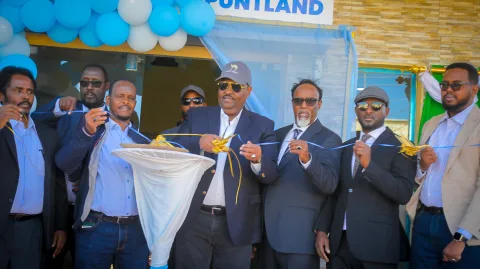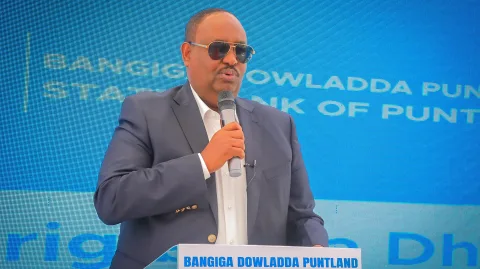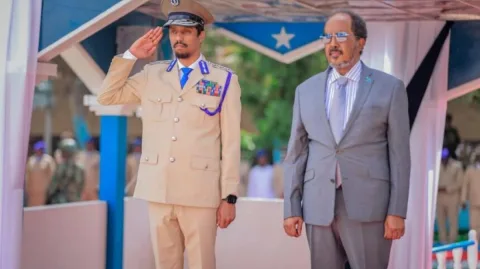Sharif Sheikh Ahmed, President of Somalia, spoke today in the capital city of Mogadishu on the Draft Constitution
 Sharif Sheikh Ahmed, President of Somalia, spoke today in the capital city of Mogadishu on the Draft Constitution that has been presented by the Independent Federal Constitutional Commission. In his statement to the media, the president noted that “drafting a constitution for a new Somalia is a solemn national undertaking which must be transparent and beyond reproach to ensure that the constitution is vested with legitimacy.â€
Sharif Sheikh Ahmed, President of Somalia, spoke today in the capital city of Mogadishu on the Draft Constitution that has been presented by the Independent Federal Constitutional Commission. In his statement to the media, the president noted that “drafting a constitution for a new Somalia is a solemn national undertaking which must be transparent and beyond reproach to ensure that the constitution is vested with legitimacy.â€
President Sharif Sheikh Ahmed also stated that – “to suffice as the constitution of Somalia, the final draft must embody the aspirations and interests of the Somali people, a task that can only be achieved through broad public participation.â€
In acknowledgment of the hard work and efforts of the Independent Federal Constitutional Commission in producing the draft constitution, President Sharif Sheikh Ahmed observed that “while the draft constitution is an improvement over the current Transitional Federal Charter, it still requires further scrutiny and input from Somali citizens, legal experts, Islamic scholars, and members of parliament to ensure that it is a true expression of the will of the Somali people.†To further this objective, the President proposed the formation of a National Advisory Council consisting of members of parliament, legal experts, Islamic scholars, cultural experts as well as citizenry.
President Sharif Sheikh Ahmed cautioned that “the draft constitution, and the ratification process should not be subjected to political manoeuvrings by Somali politicians, or subjected to arbitrary deadlines set by non–Somali actors, no matter how well intentioned, because the immense sacrifices of our martyred Ministers and Members of Parliament and the ongoing sacrifices of our soldiers obligate us to demand nothing short of an untainted, Somali driven, and Somalia-centred constitution.â€
On the other hand, outlining the most credible process that a new a constitution could be adopted the President stated, “A Constitution to be a genuine national founding document, it has to be approved through national referendum. Therefore, securing conditions that will lead to nation-wide referendum should be the top priority of the government – and the key is stabilizing the country.â€
If force majeure or conditions beyond its power prevents the Transitional Federal Institutions (TFIs) to hold national referendum, the Parliament, using the legislative powers vested on it by the Charter, may need to consider amending the 1960 Constitution — which was endorsed in a nation-wide plebiscite in 1961 — adding what is missing such as federalism and the adoption of Islamic jurisprudence – the decision however is Parliament’s,†Said the President.
Speaking of ratification of the new Constitution and the way forward after the end of the mandate of the Transitional Federal Institutions in August 2011, the President emphasized that “the Transitional Federal Government – including the President, Parliament and Council of Ministers – have not yet formally agreed on the modalities and processes in which the new constitution will be ratified.â€
As its apparent in the 1960 Constitution as well as the Interim Charter, constitutional bodies particularly the Cabinet is required to submit a policy or action-plan and the parliament has the constitutional mandate to enact laws needed for the ratification of the Constitution and how to terminate the transitional period. Such laws will only have legal effect when the President sings them.
Office of Somali President





